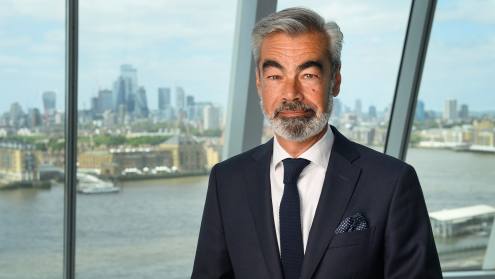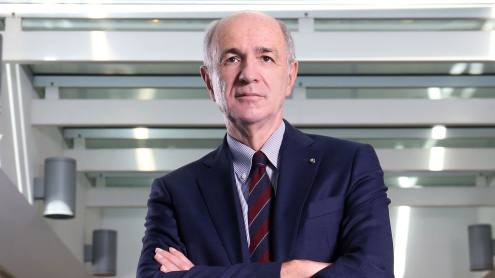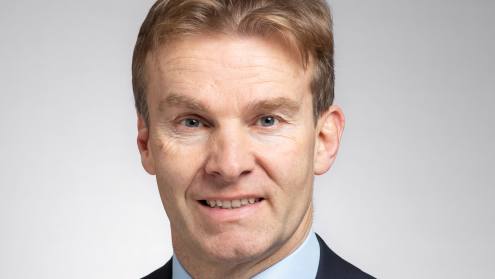Looking at Brazil’s investment banking league tables over the past couple of years highlights the strong performance of a number of local players, among them Itaú BBA. Itaú’s progression is impressive. It became one of the country’s top ranking banks in a relatively short space of time, and it has retained a lead over its rivals in many markets, particularly the debt capital markets (DCM).
Editor's choice
According to data provider Dealogic, more than $67bn was issued in DCM by Brazilian issuers in 2012 – a record high that included the largest ever volume for local bonds, or debentures, which was $15.9bn, surpassing the previous record of $15.8bn in 2006. Itaú was the top bookrunner in the country last year, as it was in 2006. In fact, the bank has been the country’s top bookrunner in five of the past seven years.
Itaú did particularly well in domestic issuances in 2012 and raised 35% of the total volume, which equates to $5.49bn over 41 deals. The top three domestic transactions last year were all Itaú deals: debentures for telecommunication company Oi; the investment agency of Brazil’s development bank, BNDES Participacoes; and energy firm Transmissora Alianca de Energia Eletrica. Alone, these issuers raised more than $3.2bn.
“Because of our background, as a lender, we tend to look at the world through a fixed-income lens,” says Jean-Marc Etlin, Itaú BBA’s head of investment banking.
Geographic balance
Itaú is also one of the leading institutions in Brazil's equity capital markets and mergers and acquisitions (M&A) advisory spaces. The bank’s approach to all business divisions is as aggressive as any other investment bank, and its ambition goes beyond Brazil.
“We started the investment banking business in 2005 with the goal of becoming one of the leaders in the Brazilian market within five years, and looking at various indicators one could perhaps say that we got there,” says Mr Etlin. “The mission for the next five years is to become a leader in the rest of Latin America, too.”
The bank already has a presence in Argentina and Colombia, and it has a representative office in Peru with plans to set up a base in Mexico too. Excitement over Latin America’s fast-growing, open-market economies is shared across investment banks with the number of potential corporate clients and issuers growing outside of Brazil. The region’s largest initial public offering last year, for example, Santander’s $4.1bn listing, was hosted by Mexico’s stock exchange. Itaú was one of the 13 bookrunners on that deal, and the only one from Brazil.
Brazilian roots
But Mr Etlin is keen to stress that the appeal of foreign markets should not come at the expense of the business in Brazil. The Brazilian market may not be growing at the same pace as some of its Latin American counterparts, but it continues to provide the largest business opportunities, by far. For each Mexican corporate that may approach the capital markets, there are about 10 times as many Brazilian corporates already on Itaú’s corporate banking books.
“If you look at the [Brazilian] companies that Itaú banks, they number about 2500. If you look at the same-sized companies in Mexico, they number only 300. And Mexico’s gross domestic product is two-thirds that of Brazil’s; so in Brazil it seems there are a higher number of entrepreneurs and businesses being created,” says Mr Etlin.
“Itaú set itself the goal of being the leading investment bank in Latin America, but this goal should not come at the cost of overlooking Brazil; we may regret that. We need to continue to gain market share in Latin America, while remaining very vigilant in our ultra-competitive home market.”
Although different in scale, Itaú proudly bases its business model on that of JPMorgan, which allows Itaú Unibanco – Itaú BBA’s parent – to tap the large deposit funding of Brazil, while spreading its investment banking business across Latin America and beyond, with a number of offices in North America, Europe, the Middle East and Asia.
Inflation fears
Itaú BBA formally came into existence in 2002 through the acquisition of BBA-Creditanstalt by Banco Itaú. BBA-Creditanstalt had been created more than a decade earlier – during Brazil’s first decade of hyperinflation – by Fernão Bracher and Antônio Beltran, in partnership with Austria’s Creditanstalt. A bold move, says Mr Etlin, and one that created one of the country’s leading investment banks. Mr Bracher’s son, Candido Bracher, is Itaú BBA’s current CEO.
After coming out of the hyperinflation years, Brazil’s inflation is more stable and remains in single digits. The country’s central bank predicts that it will remain close to 6% in the first half of this year, higher than its target range of between 4.5% and 2%.
From an economic point of view, there are worries that higher-than-targeted inflation is becoming entrenched in the Brazilian economy, as the rate has been north of the top range for more than two years. But, from the point of view of the capital markets, single-digit inflation – even if higher than the central bank’s targets – opens up great opportunities as it causes investors in the Brazilian market to look away from previously high-yielding government bonds and into equities or even corporate issuances.
“For the first time, for the vast majority of Brazilians, we have single-digit interest rates. This is a game-changer for fixed income and equities. People will have to move up the risk curve to get more return,” says Mr Etlin. “When you have 15% interest rates, why would you buy equity or anything other than government bonds? But when you have 7% interest rates and 1% to 2% real rates, institutional and individual investors will not have the returns they need so they will go find something else.”
At the same time, Mr Etlin highlights that markets will need longer to internalise a relatively low and stable inflation environment. The interbank rate, CDI, moves closely to the central bank’s basic interest rate – an indication of the influence of inflation in banking products.
“CDI is like the index-linked gilt bond in the UK: it is inflation – our financial markets are still indexed,” says Mr Etlin. “The memory of inflation hasn’t gone away yet. We, unlike Mexico, still don’t have a fixed-rate long-term yield curve. This is where it all really begins.”
International competition
Despite the specific challenges of the Brazilian market, and the leadership of local banks in the lending space, competition in the investment banking area is always fiercely fought by all players, domestic or not. But as for banking services where large balance sheets are an obvious and clear advantage, the investment banking space has also started to be led by Brazilian names. Across equity and debt capital markets, as well as M&A advisory, locally owned banks have gained the largest portion of deals and revenue pools. In the past three years, Brazilian banks have typically been securing higher shares of the fee pot, according to data providers, with Itaú BBA claiming between either the second or top share between 2010 and the end of 2012.
International banks tend to explain this through the closely knit relationship between local lenders and corporates and blame it on the large balance sheet at the disposal of local universal banks. Brazilian outfits tend to explain their success by naming the difference in dedication to the local market. “Why have local firms done better than others? I think the reason is simply focus,” says Mr Etlin. “For us, this is our life, we breathe Latin America, day in and day out.”













